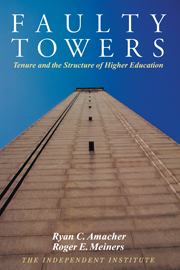The multi-billion dollar clean-up from the California fires of 2003 will take years. Thousands of people must rebuild their homes and businesses. Yet while houses can be replaced, lives and cherished mementos cannot. These unfortunate Californians have become the latest victims of absentee owners: in this case, Washington-based politicians and forestry agencies. Their loss can either be a senseless tragedy, or the catalyst for reform. But for real reform to take place, centralized forest land control and the misuse of forests for political purposes must be rejected absolutely.
While the fires are unusual (partly from the effects of bark beetle infestation), they had been predicted by analysts for years who warned of the dangers of recent fads in forestry management, or rather lack of management, on public lands. Had more underbrush been thinned over the years, and selective timbering been more common, the fires would not have been so severe and probably could have been prevented. Nor would over 6 million acres have burned in western states in 2002—an area larger than New Jersey. Advocates of more active management of federal forests (including the thinning of forests) are justified in saying, “We told you so.”
Some on the other side assert that this is “nature’s way.” But tragically, so are malaria, cholera, and AIDS, and no one advocates leaving these to “nature.” Opponents of increased thinning and harvesting of federal forests have also asserted that harvests enrich big timber companies. Yet while the U.S. Forest Service sits on over 200 million acres of forests, or about 27 percent of forest land in the U.S., that land produces only about 5 percent of the nation’s timber output. Most big timber companies moved away years ago and today receive their supplies from private lands in the southeast and Canada, as well as from the strip-mined forests of Russia and other countries that pay little attention to environmental niceties. Furthermore, when fewer federal trees are harvested, it means that private forests increase in value, thereby increasing profits for those holding stocks of lumber and lumber-to-be in a less competitive market. For all that big timber companies care, federal forests could be locked up for good.
Management of America’s public forests, especially in the west, is based on nationalized government planning whose rules are determined by politicians. Forest management is under the direct control of Congressional committees overseeing the Department of Agriculture (U.S. Forest Service) and the Department of Interior (Bureau of Land Management). The tragic decision made in Washington some time ago was to stop most thinning and harvesting on federal lands. This year, requests for federal assistance to remove unhealthy trees on 415,000 acres of federal forest lands in California were mired for months in bureaucratic machinations.
Yet unless something changes, it is unlikely that Washington will take responsibility for its disastrous decisions. The unfortunate record shows politics as usual when Congress “investigates” the fires that have plagued the west in recent years. Members of Congress sternly question the heads of various agencies. But it is the President, Senators and Representatives who should be on the hot seat. They set the rules.
Even when politicians are aware of the dangers of such policy, they are equally well aware of the political risk of going against current popularly held opinion. This was well illustrated prior to the 2002 elections by Democratic Senator leader Tom Daschle’s trying to slip an amendment into a bill that would allow forests in South Dakota to be thinned (while those in California and elsewhere would not). Daschle may have wished to retain his image as environmentally-correct, but he also had a mission to get Democrats elected in South Dakota, where people were fed up with the fire hazards. Last week, and only after the devastation of the California firestorms, did the Senate finally deem it prudent to vote 80-14 to allow the thinning of federal forests that Daschle wanted for his state.
None of the members of the House subcommittees overseeing forestry are expert on forest management. However, even if congressional oversight committees were staffed by professional foresters, no one-size-fits-all forests policy would work. Just as professional foresters differ in opinions about proper forest management, forests themselves are diverse. Some are remote, some are urban. Some are rain forests; some forests are in deserts. Each needs diverse management.
One solution could be to let Californians independently determine the treatment of federal forests in California, let Floridians determine the treatment of federal forests in Florida, where each state forestry department has specialized knowledge of its own ecology. Even further, since the forests near San Diego are different from the forests near Redding, federal forests could be divested to the counties or communities in which they are located. Long-term contracts or ownership rights for each federal forest could be granted to associations, foundations or other organizations. For example, the Sierra Club, Nature Conservancy or Audubon Society could own or manage federal forests under contract, even as many environmental agencies own and manage thousands of acres under deeded private conservancies across the country today. Other forests could be contracted to private firms and qualified organizations that offer services to manage forests. Unlike the current nationalized system, in each of these cases those involved would be directly answerable for their forestry operations, including full accountability for any failure.
Just as forests have diverse characteristics, diverse and decentralized management would benefit all, except of course Washington-based vested interests, who would lose control over lands they have misused and mismanaged.
If we really want our forests to be held for the benefit of all, including wildlife, now and into future generations, let’s get forest lands out of the disastrous realm of politics and special interests and into the care of those who demonstrate they can be entrusted with such a legacy.











